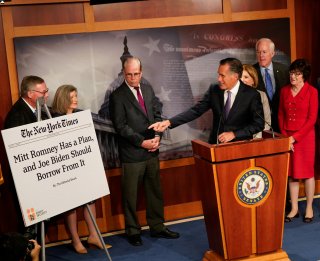Can Mitt Romney Save the Child Tax Credit?
Mitt Romney's proposal could make a bipartisan effort to extend the child tax credit a possibility.
The future of the expanded child tax credit isn’t looking good. The new credit, which mandated direct payments for most American families each month between July and December of 2021, was brought into being by the American Rescue Plan Act last spring. Multiple studies have found that the program helped alleviate child hunger and poverty, and the direct payments may even improve brain function in babies.
The credit, however, only went into effect for one year. And while the White House was pushing for another year of the credit through the Build Back Better package, the version that passed the House last year appears to have stalled out in the Senate.
There are ongoing talks about reviving the package in some form, but it appears unlikely that the child tax credit will pass as part of any compromise that’s supported by Sen. Joe Manchin (D-WV), who has been a skeptic of the credit. A group of Democrats this week urged the president not to give up on the expanded child tax credit, with Sen. Michael Bennet (D-CO) authoring a letter stating that the credit should remain the “centerpiece" of the Build Back Better agenda.
"Without the expanded credit, nearly ten million children will be thrown back into or deeper into poverty this winter, increasing the monthly child poverty rate from roughly 12% to at least 17%," the letter to the president said. "Raising taxes on working families is the last thing we should do during a pandemic."
But if there’s another way around that roadblock, it could involve a proposal made last year by Sen. Mitt Romney (R-UT), the former Republican presidential nominee.
Early last year, Romney introduced a proposal for a child allowance known as the Family Security Act. The bill arrived around the time that the American Rescue Plan was being debated by Congress. That version of the bill would have granted $4,200 per child to families with children aged five and under. Families with children between six and seventeen would have received $3,000 for each child annually. There were also phaseout thresholds, and the program would have been administered by the Social Security Administration rather than the IRS.
However, the bill did not advance in Congress. But after Manchin came out against the House version of Build Back Better, Romney tweeted about his previous plan and suggested a compromise that could involve his proposal.
“Now that it’s clear ‘Build Back Better’ isn’t moving forward & with bipartisan opposition to extending the President’s ill-crafted Child Tax Credit, the Administration has an opportunity to actually work with Republicans & Democrats on lasting, fiscally-responsible family policy,” Romney wrote.
While it doesn’t appear that Romney’s proposal has gotten much momentum in Congress, it has received notable support from outside government. The People’s Policy Project, a progressive organization, said that “Romney’s plan is our only real hope for enacting a child allowance during this Congress.” The organization laid out a scenario in which Romney and the other forty-nine senators who caucus with the Democrats could vote for the bill through reconciliation. This would allow Romney's proposal to pass without Manchin's support.
This week, the New Republic went deeper into the Romney proposal and discussed the possibility that it could become part of the solution for the child tax credit. The report argued that the Romney tax credit proposal and the Build Back Better agenda could be enacted through separate pieces of legislation. President Biden appeared to admit at his recent press conference that any final version of the Build Back Better framework is unlikely to include the expanded child tax credit.
“The most significant difference between the Democratic proposal and the Family Security Act rests in the revenue stream,” the piece said. “Critically for Republicans, the Romney plan is deficit-neutral through at least 2025 when many tax breaks implemented under President Donald Trump expire. Because it is fully paid for, it might be easier to make permanent.”
This would make a bipartisan effort to extend the child tax credit a possibility, although Republicans might be reluctant to deliver the president a victory in a midterm election year.
Analyst Jeff Maurer argued this week for the renewal of both the expanded child tax credit (CTC) and a “beefed-up” earned income tax credit (EITC).
“The CTC gives people cash whether they work or not, which some people see as a feature, while others see it as a bug,” he wrote. "The EITC is the opposite: You have to work a job to get it, which, again, some people like and some people don’t. But the right should realize that the EITC reduces the chance that the CTC will encourage laziness, and the left should realize that the EITC makes a robust CTC possible.” Maurer concluded that “some of the most salient concerns about either are addressed by the presence of the other.”
Mitt Romney may be the only person able to save the child tax credit.
Stephen Silver, a technology writer for The National Interest, is a journalist, essayist and film critic, who is also a contributor to The Philadelphia Inquirer, Philly Voice, Philadelphia Weekly, the Jewish Telegraphic Agency, Living Life Fearless, Backstage magazine, Broad Street Review and Splice Today. The co-founder of the Philadelphia Film Critics Circle, Stephen lives in suburban Philadelphia with his wife and two sons. Follow him on Twitter at @StephenSilver.
Image: Reuters.

